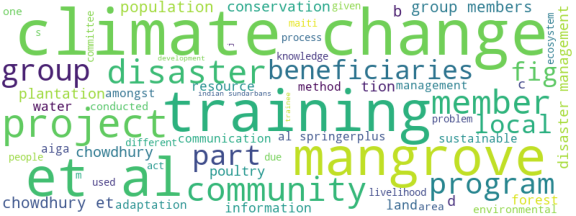| Id | 911 | |
| Author | Chowdhury A., Maiti S.K., Bhattacharyya S. | |
| Title | How to communicate climate change ‘impact and solutions’ to vulnerable population of Indian Sundarbans? From theory to practice | |
| Reference | Chowdhury A., Maiti S.K., Bhattacharyya S.; How to communicate climate change ‘impact and solutions’ to vulnerable population of Indian Sundarbans? From theory to practice ;SpringerPlus vol:5.0 issue: 1.0 page: |
|
| Link to article | https://www.scopus.com/inward/record.uri?eid=2-s2.0-84980007082&doi=10.1186%2fs40064-016-2816-y&partnerID=40&md5=6874fb854b6782bc74044f1cd0b0b721 |
|
| Abstract | Introduction: Global consciousness on climate change problems and adaptation revolves around the disparity of information sharing and communication gap between theoretical scientific knowledge at academic end and practical implications of these at the vulnerable populations’ end. Coastal communities facing socio-economic stress, like densely populated Sundarbans, are the most affected part of the world, exposed to climate change problems and uncertainties. This article explores the successes of a socio-environmental project implemented at Indian Sundarbans targeted towards economic improvement and aims at communicating environmental conservation through organized community participation. Case description: Participatory rural appraisal (PRA) and the wealth rank tool (WRT) were used to form a “group based organization” with 2100 vulnerable families to give them knowledge about capacity building, disaster management, resource conservation and sustainable agriculture practices. Training was conducted with the selected group members on resource conservation, institution building, alternative income generation activities (AIGA) like, Poultry, Small business, Tricycle van, Organic farming and disaster management in a participatory mode. The climate change ‘problems–solutions’ were communicated to this socio-economically marginalized and ostracized community through participatory educational theater (PET). Discussion and evaluation: WRT revealed that 45 % of the population was under economic stress. Out of 2100 beneficiaries’, 1015 beneficiaries’ started organic farming, 133 beneficiaries’ adopted poultry instead of resource exploitive livelihood and 71 beneficiaries’ engaged themselves with small business, which was the success stories of this project. To mitigate disaster, 10-committees were formed and the endemic knowledge about climate change was recorded by participatory method validated through survey by structured questionnaire. As a part of this project 87 ha of naked deforested mudflat was reclaimed with endangered mangroves involving target community members aimed to sequester CO2, control soil erosion and act as a barrier during natural disasters. Conclusion: This case study concluded that participatory method of communication, aiming not only to communicate theoretical knowledge, but also to devise adaptation strategies through conservation of endemic knowledge, popularizing sustainability through Micro Finance Institutions and promoting AIGA along with motivating vulnerable community to restore degraded forest lands, could be a effective solution to practically combat climate change problems. © 2016, The Author(s). |
|
| Keywords | AILA; Alternative income generation activity; Climate change adaptation strategies; Communication; Community mobilization; Disaster management; Endemic knowledge; Mangrove conservation; Micro-finance institution (MFI); Non-Governmental Organization (NGO); Social work; Wealth rank tool |
Wordcloud:



